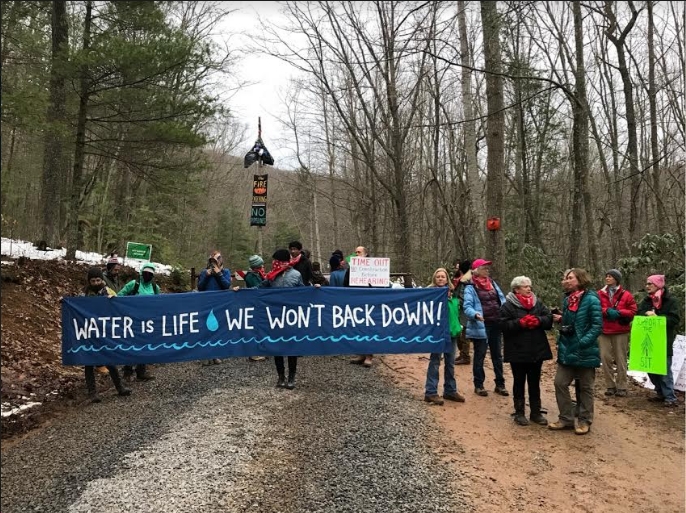
Extensive opposition to MVP to protect rivers & streams
Submitted by Guest Columnist — Karenna Gore, Virginia Mercury, October 18, 2021
In the final months of 2021, a decision is looming in Virginia about the controversial Mountain Valley Pipeline, which would carry fracked gas on a 303-mile route that crosses hundreds of bodies of water and traverses steep slopes that are prone to erosion.
The State Water Control Board will vote on whether to grant the company the water quality certification required under the Clean Water Act after a public comment period that closes on October 27th.
The company behind the pipeline has already been cited for more than 350 violations along this route. Local communities and landowners are objecting to the use of eminent domain for a project averse to the public interest. The federal Environmental Protection Agency has recommended that the Army Corps of Engineers deny the section 404 permit due to “substantial concerns” about the project’s impact on streams and rivers.
And, on top of all that, this pipeline is not even needed. As the Institute of Energy Economics and Financial Analysis wrote in a report in March 2021, “in the seven years since the project was first proposed, the rationale for the Mountain Valley Pipeline has largely disappeared.”
We are also marking the 49th anniversary of the Clean Water Act, which was enacted on October 18th in 1972, after Congress overrode President Richard Nixon’s midnight veto. A close look at the origins of that act can help us understand what is at stake in this pipeline decision.
The principal sponsor, Sen. Edmund Muskie, D-Maine, had a personal passion for protecting waterways stemming from his childhood in the small town of Rumford, where local paper mills had poured so much chemical pollution into the Androscoggin River that it could no longer support aquatic life.
In the 10 months of 1972 that the bill was in conference, there had been ample testimony about the terrible state of the nation’s waterways, including inundations of sewage and chemicals, proliferation of bacteria, massive fish die-offs and an eye-catching series of fires on Cleveland’s Cuyahoga River. Faced with Nixon’s veto message, which cited the price-tag, Muskie posed a rhetorical question to his fellow lawmakers: “Can we afford clean water? Can we afford rivers and lakes and streams and oceans which continue to make life possible on this planet? Can we afford life itself?”
It may seem strange from the viewpoint of today’s politics, but Republican Sen. Howard Baker agreed. Baker was from the mountainous region of Tennessee that is not far from Virginia. “As I have talked with thousands of Tennesseans, I have found that the kind of natural environment we bequeath to our children and grandchildren is of paramount importance,” he said, “If we cannot swim in our lakes and rivers, if we cannot breathe the air God has given us, what other comforts can life offer us?”
The issues that framed the Clean Water Act are critical to Virginia’s decision on this pipeline. It is common sense that the people who live closest to the water in question are the ones best able to assess whether it is in harm’s way, and that they should be able to rely on their state governments to protect local natural heritage. As the U.S. Supreme Court has noted, “State certifications under §401 are essential” to the intent of the act because “No polluter will be able to hide behind a Federal license or permit as an excuse for a violation of water quality standard[s].” (S. D. Warren Co. v. Maine Bd. of Environmental Protection)
Virginians who live along this pipeline route are experiencing a terrible burden. It is financial, but it also goes far beyond that. They are forced to watch as the government hands over their landscape to private interests who damage it, all for the sake of a project that does not benefit them and should not even exist. As Donna Pitt of Giles County said, “No amount of mitigation bank credits can restore the purity of those waters and wetlands.”
There are also public health and environmental justice concerns, particularly if you take into account MVP’s “Southgate Extension” plan, which includes a compressor station in Pittsylvania County that would perpetuate the shameful pattern of concentrating toxins in Black and Indigenous communities.
As we go further down the road of reckoning with the global environmental crisis (keep in mind that this pipeline would have an impact on the atmosphere equivalent to 26 typical coal plants, or 19 million additional cars), we need to find shared values that can help us restore balance.
We need public servants to ask the questions that Muskie and Baker asked, listen to the people they serve and act to protect the most commonly held and precious form of wealth there is: land, air and water.
>>> Karenna Gore is the founder and executive director of the Center for Earth Ethics at Union Theological Seminary.
